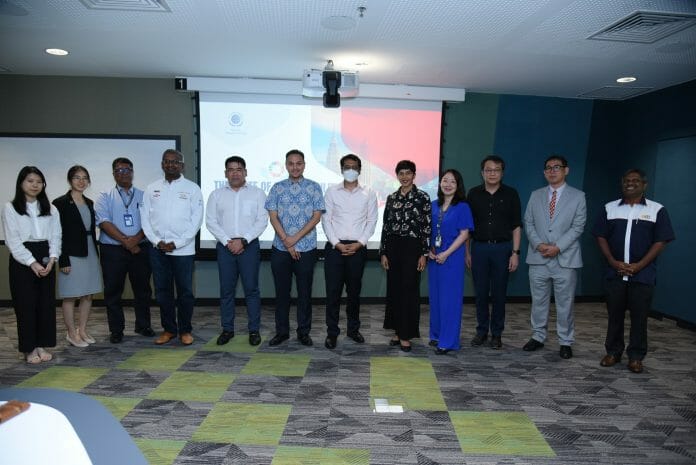The demand for a positive environment, social and governance (ESG) behaviour is now more robust among global and ASEAN businesses, regulators and investors. A Roundtable titled, ‘The State of Sustainability in the Malaysian Private Sector’, jointly organised by Monash University Malaysia and UN Global Compact Network Malaysia & Brunei (UNGCMYB), was recently held to discuss findings from the Malaysia Businesses Sustainability Pulse Report (SPR) 2022 launched by UNGCMYB. The Roundtable brought together public-private-academia actors to examine Malaysia’s sustainability landscape and explore potential collaboration opportunities to advance the local sustainability agenda.
“The SPR report is the first of its kind in Malaysia and was driven by the need for localised data. It aims to build a better understanding of the landscape and drivers in sustainability practices and strategies among Malaysia’s private sector,” said Faroze Nadar, Executive Director of UNGCMYB, during the opening remarks and key findings sharing from the SPR.
Moderator Professor Avvari V. Mohan, Deputy Head of the School of Business, Monash University Malaysia, started the discussion and expressed his concerns about product pricing for low-income families and the B40 group and that there seemed to be more compliance-oriented data collection rather than performance-oriented ones.
Referring to the SPR findings, Wong Chiun Chiek, Senior Executive Vice President of Bursa Data Business, said “The data gathered from the SPR is essentially a big call-to-action to all of us – from regulators to government agencies to financial institutions, corporates and academia. The important question is how do we use data as an enabler to help the economy in its journey to pivot to green?” Wong added that Bursa Malaysia recently announced the enhanced listing requirements incorporating ESG practices for PLCs to disclose, and the launch of the PLC Transformation Programme eligible to all listed companies which integrates Purpose & Performance, Sustainability, Investor Relations, Digital Enablement and Nation Building under one holistic framework.
In terms of collaboration opportunities between the private sector and academic institutions to push the sustainability agenda in Malaysia and ASEAN, Associate Professor Dr Grace Lee Hooi Yean stated that academia could provide research support to investigate the reasons behind numbers to gain better insights into the impact work of the private sector. “A collaboration with Monash University means a partnership with one of the world’s best experimental economics teams. We can produce systematic scientific reports of what you do. Give us the data, and we will give you what you want,” Lee said. Lee also added that students were keen to work on real-life data.
Professor Mohan concurred by stating that academia and private sectors can work together to identify and build local or regional case studies of sustainability best practices which can be used in capability-building learning programs, which are also applicable to policy recommendations.
Malaysia External Trade Development Corporation (MATRADE) Sustainability Lead, S.Jai Shankar indicated that we need to ensure that Malaysia’s sustainability agenda in itself becomes sustainable. He noted that for this to take place, there is an urgent need to ensure Malaysian companies which are ESG compliant or those which are producing green products and services will benefit from the country’s green procurement agenda. “Only then these companies can actively be involved in the emerging and lucrative green economy because their participation in the local green economy would have given them the requisite track record and economy of scale to compete effectively in the global marketplace”, he said. He added that once Malaysia greens its supply chain, the positive impact on the country’s trade and investment flow and its consequent impact on the country’s GDP will ensure the country in the long run has the financial means to continue supporting the nation’s sustainability agenda. He also stated that Malaysia can take this opportunity to develop its country brand along the premise that it is the green hub of the region.
Youngsters these days want to work for companies tagged as do-gooders. According to Tata Consultancy Services Malaysia (TCS Malaysia) Country Head, Jeevan Rajoo, every project at TCS Malaysia has been infused with sustainability agendas for the past three to four years, and the results have been phenomenally significant. TCS Malaysia has an incubator program with one of the country’s largest oil and gas companies (the first in Malaysia), where social enterprises are created for youngsters to address social issues such as mental health care, generation gaps and jobs for people with disabilities. Mohamad Irwan Bin Aman, Head of Sustainability, Sarawak Energy Berhad, reiterated the importance of data and how companies can make an impact by introducing mitigation plans.
Other Participants in the Roundtable included Raja Amir Shah Raja Azwa (HSBC Amanah Malaysia Berhad), Dr Sumitra Nair (Malaysia Digital Economy Corporation), and Professor Andy Chan (University of Nottingham Malaysia).
Participants emphasised the importance of accurate data for decision-making, benchmarking, and policy-making around sustainability “Data for Good”. There is a need to encourage private sectors to enhance sustainability disclosures. Sustainability reporting should be cost-effective and applicable to both corporates/SMEs.









